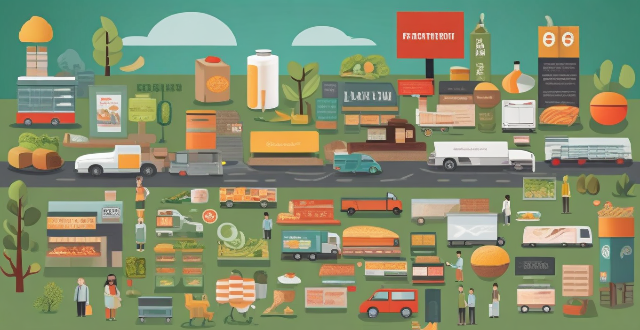The fast food industry has a significant impact on local economies through job creation, economic growth, competition with local businesses, public health considerations, and environmental impacts. While it offers employment opportunities and contributes to local spending, it can also strain healthcare systems and generate waste. Communities must consider these implications when evaluating the role of fast food within their local economies.

The Economic Implications of the Fast Food Industry on Local Communities
The fast food industry has become a ubiquitous part of modern life, with chains and franchises sprouting up in cities and towns around the world. While these establishments offer convenience and affordability to consumers, they also have significant economic implications for local communities. Here are some of the key ways in which the fast food industry impacts the economy at the local level:
Job Creation
Employment Opportunities
Fast food restaurants provide employment opportunities for people of all ages and skill levels. They often hire individuals who may not have extensive work experience or formal education, offering them a chance to gain valuable job skills and earn a living wage.
Training and Development
Many fast food chains invest in training programs that teach employees customer service skills, food safety protocols, and management techniques. This can lead to career advancement within the company or transferable skills that can be applied to other industries.
Economic Growth
Local Business Spending
Fast food restaurants contribute to local economic growth by purchasing goods and services from other businesses in the area. This includes everything from food ingredients and equipment to marketing materials and cleaning supplies.
Property Taxes
Commercial properties like fast food restaurants generate property taxes that fund local government services such as schools, roads, and public safety initiatives.
Competition with Local Businesses
Impact on Independent Restaurants
Fast food chains can create competition for independent restaurants, which may struggle to compete on price or convenience. This can lead to decreased revenue for locally owned businesses and potentially even closures if they cannot adapt to the changing market conditions.
Changes in Consumer Spending Habits
As more people turn to fast food options for their meals, there may be a shift in consumer spending away from other types of foodservice establishments, such as sit-down restaurants or specialty food shops.
Public Health Considerations
Healthcare Costs
The prevalence of fast food can contribute to increased healthcare costs due to diet-related illnesses like obesity, diabetes, and heart disease. These costs can strain local healthcare systems and impact residents' financial well-being.
Nutrition Education Programs
Some communities may invest in nutrition education programs to counteract the negative health effects associated with fast food consumption. This can involve collaborations between schools, healthcare providers, and community organizations.
Environmental Impact
Waste Management
Fast food restaurants generate a significant amount of waste, including packaging materials and food scraps. Proper waste management strategies must be implemented to minimize environmental harm.
Energy Consumption
These establishments often use energy-intensive equipment like deep fryers and refrigeration units. Efforts to reduce energy consumption through efficient practices can help lessen the environmental footprint of the fast food industry.
In conclusion, while the fast food industry offers numerous benefits in terms of job creation and economic growth, it also presents challenges related to competition with local businesses, public health concerns, and environmental impacts. It is essential for communities to consider these implications when evaluating the role of fast food within their local economies.